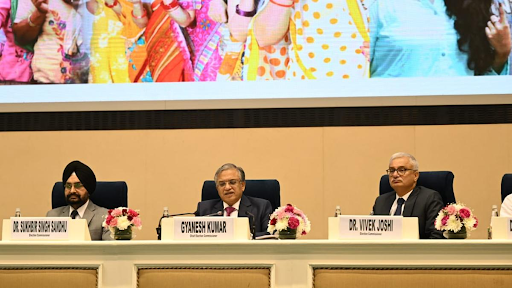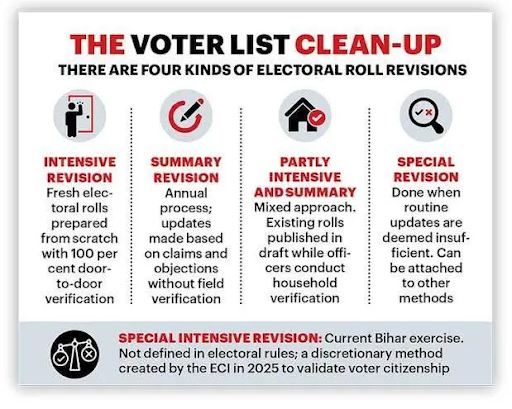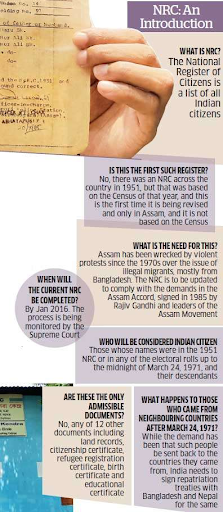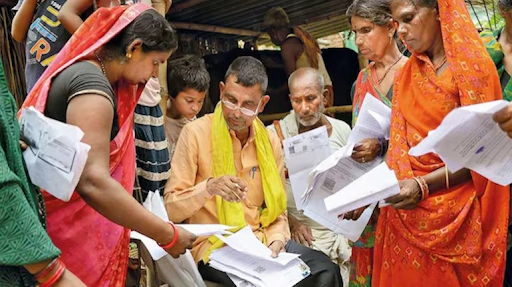



The Election Commission’s Special Intensive Revision reflects its commitment to clean and inclusive elections. Mandated by the Representation of the People Act, 1950, it ensures accurate voter rolls by removing ineligible entries, adding eligible citizens, and addressing demographic shifts—strengthening the integrity of India’s democratic process.

Copyright infringement not intended
Picture Courtesy: THE HINDU
The Election Commission of India has started the second phase of Special Intensive Revision of voter lists in 12 States and Union Territories.
|
Read all about: Special Intensive Revision (SIR) |
It is a time-bound, door-to-door verification process designed to ensure electoral rolls are accurate, complete, and up-to-date. Its core objectives include:

Unlike routine annual revisions, SIR is a more focused and in-depth drive, often implemented when significant discrepancies are noted or before major elections.
Phased Implementation
A successful pilot phase in Bihar resulted in a 6% reduction in electors without any appeals against deletions.
Second Phase Coverage
Currently, 12 states and Union Territories are covered, including Andaman & Nicobar Islands, Chhattisgarh, Goa, Gujarat, Kerala, Lakshadweep, Madhya Pradesh, Puducherry, Rajasthan, Tamil Nadu, Uttar Pradesh, and West Bengal. This phase targets about 51 crore electors.
Exclusion
Assam is excluded due to its ongoing National Register of Citizens (NRC) process and specific provisions under the Citizenship Act.

Operational Mechanism:
Booth Level Officers (BLOs) will conduct multiple household visits, distributing Unique Enumeration Forms for voter verification and linking family records.
Online submission options are also available via the ECI's Voters' Portal and Voter Helpline App.
Ensuring Inclusivity and Participation
Enrolling all eligible citizens, including newly turned 18-year-olds, women, and migrant workers, thereby boosting voter participation.
Maintaining Purity and Integrity
Addressing large-scale migration, multiple registrations, and the presence of deceased or non-citizen voters that have accumulated over two decades since the last nationwide revision (2002-2005).
The SIR aims to eliminate "ghost voters" and duplicate entries that can lead to electoral manipulation.
Addressing Political Party Concerns
Responding to consistent complaints from political parties regarding the "impurity" of electoral rolls promoting trust among stakeholders.
Constitutional Mandate
Article 324 of the Constitution grants the ECI the power to "superintend, direct, and control" electoral roll preparation, while Section 21(3) of the Representation of the People Act, 1950, empowers the ECI to direct special revisions.
Facilitating Free and Fair Elections
By ensuring clean and updated rolls well in advance, SIR minimizes disputes and challenges during elections, strengthening credibility.
Risk of Disenfranchisement
Eligible voters could face disenfranchisement due to a rushed process, over-reliance on Booth Level Agents, or insufficient documentation/understanding.
Administrative Burden and Timelines
The sheer scale of a nationwide door-to-door verification puts immense pressure on BLOs and Electoral Registration Officers, and tight timelines can lead to errors.
Frequent migration, especially in urban areas, makes accurate house-to-house verification challenging.
Digital Divide and Accessibility
While online options exist, digital literacy and access remain challenges. Only 38% of Indian households are digitally literate, according to a Ministry of Labour and Employment report.
Transparency and Trust Deficit
Deletions of names without transparency erode public trust. The Supreme Court during the Bihar SIR, mandated the ECI to publicly release names and reasons for exclusion to improve accountability and access.
Aadhaar Integration and Citizenship Verification
Aadhaar is not valid proof of citizenship, domicile, or date of birth, which complicates eligibility verification during the revision process.
The Election Commission of India (ECI) lacks the authority to administer citizenship tests.

Ensuring Transparency and Public Trust
The ECI should publicly release detailed data on voter additions and deletions, including justifications and appeal processes, across various platforms to address manipulation concerns and build public trust, as mandated by the Supreme Court.
Strengthening the Booth Level Officer (BLO) Network
Effective training, better tools, clear guidelines, and robust data management for BLOs are crucial for the initiative's success and accurate verification.
Leveraging Technology for Greater Inclusivity
Expand and promote digital platforms like the Voter Helpline App for tech-savvy urban and young voters. Improve electoral roll integrity by securely linking them with government databases (e.g., birth/death registries) while ensuring privacy.
Promoting a Collaborative Approach
Greater cooperation with recognized political parties and civil society organizations can help in reaching communities and assisting citizens in the claim and objection process.
Addressing Legal Ambiguities
A clear legal framework is needed for using identification documents like Aadhaar for voting, and it must include strong safeguards against its misuse for citizenship verification.
The ECI's Special Intensive Revision is crucial for maintaining electoral integrity, but requires transparency, enhanced communication, procedural refinement, technology, strong grievance mechanisms, and voter education to ensure an inclusive and trustworthy electoral roll that strengthens Indian democracy.
Source: THE HINDU
|
PRACTICE QUESTION Q. Consider the following statements about the Special Intensive Revision (SIR) of electoral rolls: 1. Elector's Photo Identity Card (EPIC) is the sole document accepted as proof of eligibility during such revisions. 2. The timeline for conducting an SIR is constitutionally mandated to be a minimum of six months. Which of the above statements is/are correct? A) 1 only B) 2 only C) Both 1 and 2 D) Neither 1 nor 2 Answer: D Explanation: Statement 1 is incorrect: The ECI's guidelines for the Special Intensive Revision (SIR) of electoral rolls do not specify EPIC as the sole document for proving eligibility. The ECI has specified a list of 11 documents for new voter registration during the Bihar SIR, including birth certificates, passports, and permanent resident certificates. Statement 2 is incorrect: The Representation of the People Act, 1950, particularly Section 21, empowers the ECI to conduct special revisions of the electoral roll at any time for recorded reasons. The ECI sets the schedule for revisions, and the specific timeline can vary depending on the nature and intensity of the revision. |
The SIR is a comprehensive, time-bound exercise to update the electoral roll. It involves a house-to-house survey to ensure all eligible citizens are registered and that ineligible, dead, or shifted voters are removed.
This revision is necessary to maintain the integrity of the voter list. Reasons for the current intensive revision include rapid urbanization, frequent migration, young people turning 18, and correcting outdated information. The aim is to make the electoral rolls more transparent and error-free.
The ECI conducts the SIR based on its constitutional powers under Article 324 and the Representation of the People Act, 1950. These legal provisions ensure that the electoral roll is maintained accurately, including the addition of eligible voters and the removal of ineligible or deceased voters.



© 2026 iasgyan. All right reserved